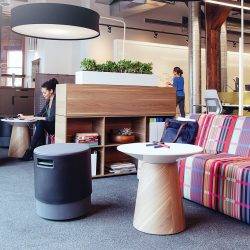December 8, 2023
Ding! Dong! IN Magazine Issue 18 is available now for you
 Well Christmas may get earlier every year, but the digital version of issue 18 of IN Magazine is right on time to deliver all your festive workplace thinking. In this issue: why the world’s biggest tech firms may no longer offer the best blueprint for working culture; Nigel Oseland doesn’t like Half Man Half Biscuit for some reason but does have a lot of great things to say about evaluating offices; you can’t just copy the design of an office you like and expect it to work the same; nothing about working life attracts more moans than noisy colleagues, so we look at one or two things you can do about it; why sometimes you have to turn your back on rationality; Kay Sargent and Jennifer Bryan urge you to change your habits; how to make the most of each day; and the brakes the UK is applying to its own aim of becoming a science and tech superpower. And of course much more. (more…)
Well Christmas may get earlier every year, but the digital version of issue 18 of IN Magazine is right on time to deliver all your festive workplace thinking. In this issue: why the world’s biggest tech firms may no longer offer the best blueprint for working culture; Nigel Oseland doesn’t like Half Man Half Biscuit for some reason but does have a lot of great things to say about evaluating offices; you can’t just copy the design of an office you like and expect it to work the same; nothing about working life attracts more moans than noisy colleagues, so we look at one or two things you can do about it; why sometimes you have to turn your back on rationality; Kay Sargent and Jennifer Bryan urge you to change your habits; how to make the most of each day; and the brakes the UK is applying to its own aim of becoming a science and tech superpower. And of course much more. (more…)











 You don’t have to look far to find misinformation. Just a few weeks ago, amid the aftermath of the coup in Niger, online platforms were being
You don’t have to look far to find misinformation. Just a few weeks ago, amid the aftermath of the coup in Niger, online platforms were being 





















December 8, 2023
Ten years of Insight and a few things I think I know (one of our most read pieces this year)
by Mark Eltringham • Comment, Flexible working, Technology, Workplace, Workplace design